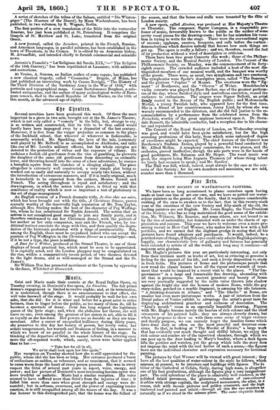31insit.
Grid and Mario made their rentree at the Royal Italian Opera, on Tuesday evening, in Donizetti's fine opera, La Favorite. The fair prima donna's engagement is limited to twelve nights; and, at its termination, it is understood, though there is no announcement to that effect, she will take farewell of the stage. It would probably be well for her own sake, that she did : for it is wiser and better for a great actor to retire betimes, than to linger before the public, as too many of them do, till he becomes a spectacle of decay. Grist has long reigned the legitimate queen of the lyric stage ; and, when she abdicates her throne, she will leave no one, even among the greatest of her sisters in art, able to fill it so royally as she has done. Her powers are as durable as they are tran- scendent. After a career of unequalled brilliancy during thirty years, she preserves to this day her beauty of person, her lovely voice, her ardent temperament, her warmth and freshness of feeling, in a manner to which we know of no parallel in the whole history of the stage. In thinking of the departure of Grisi, we cannot' refrain from uttering once more the oft-repeated words, which, surely, never were better applied than to her :—
" Take her for all in all, We ne'er shall look upon her like again."
Her reception on Tuesday showed how she is still appreciated by the public, whose idol she has been so long. Her entrance produced a burst of enthusiasm so sudden, so vehement, and so unanimous, that it seemed to come warm from the heart of every person present. She was in every respect the Grisi of several past years in aspect, voice, energy, and power ; and her picture of Donizetti's most interesting heroine never was more truthful or pathetic. Mario had a similar reception. Zs voice seemed to have suffered more than Grisi's from the injuries of time ; it failed him more than once when great strength and energy were de- manded ; but in softness, sweetness, and the power of expressing tender emotion, it is still unequalled among all the tenors of the day. It was a due honour to this distinguished pair, that the house was the fullest of
the season, and that the boxes and stalls were tenanted by the 6lite of London society. A new opera, called Aimina, was produced at Her Majesty's Theatre on Thursday. The composer, Signor Campana, is a respectable pro- fessor of music, favourably known to the public as the author of some pretty vocal pieces for the drawing-room ; but he has mistaken his voca- tion in trying to write for the stage. There were the conventional signs of success ; applause, encores, bouquets, and calls before the curtain : demonstrations which deceive nobody that knows how such things are got up. The opera is really a failure ; and we, therefore, record the fact of its production without a word of description or criticism.
There have been two great Concerts this week ; those of the Philhar- monic Society, and the Musical Society of London. The Concert of the Philharmonic Society, on Monday, was the commencement of its forty- eighth season. The crowded audience included a host of the most dis- tinguished members of our musical world, and the banquet was worthy of the guests. There were, as usual, two symphonies and two overtures. The symphonies were Spohr's descriptive piece, called "The Seasons," and the glorious " Jupiter " of Mozart. The overtures were the "Eg- mont" of Beethoven, and the " Oberon" of Weber. Mendelssohn's violin concerto was played byHerr Becker, one of the greatest perform- ers of the day, whose finished style and marvellous execution, roused the audience to enthusiasm. The singers were Signor Belletti, an artist firmly rooted in the favour of the English public ; and Mademoiselle Michel, a young Swedish lady, who appeared here for the first time. She is a Mend of her countrywoman, Jenny Lind, by whom she was warmly recommended to the directors, and she did full justice to the re- commendation by a performance from the celebrated scene from the Preiseheitz, worthy of the great applause bestowed upon it. Dr. Stern- dale Bennett, the admirable conductor, had a reception due to his charac- ter and reputation. The Concert of the Royal Society of London, on Wednesday evening was good, and would have been quite satisfactory, but for the high sounding professions of this body, from which some unheard-of degree of excellence might be expected. The chief feature of the Concert was Beethoven's Sinfenia Eroica, played by a powerful band conducted by Mr. Alfred Mellon. A symphony concertante, for two pianos, and the orchestra, proved ineffective, though the solo parts were in the hands of good performers, Mr. Salaman and Mr. Sloper. The vocal music was good, the singers being Miss Augusta Thomson (of whose rising talent we lately had occasion to speak,) and Mr. Bentley.
The Hall was fall, which, indeed, must always be the case at the con- certs of this Society; for its own members and associates, we are told, number more than a thousand.


























 Previous page
Previous page